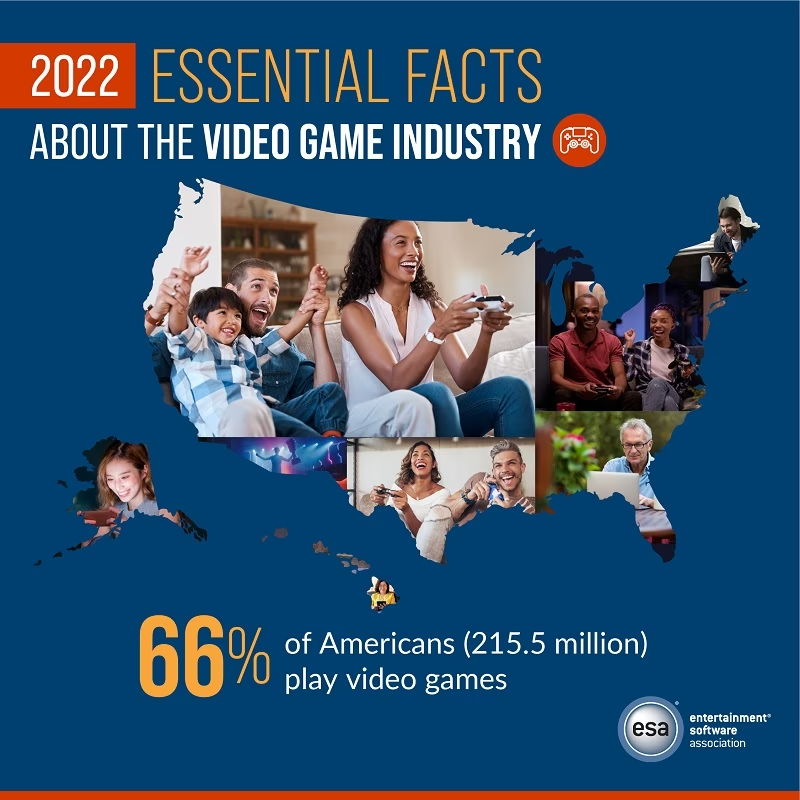A total of 66% of Americans, or 215.5 million people, play video games and attitudes toward games have gotten more positive during the pandemic, according to the Entertainment Software Association (ESA).
The data comes from the video game trade group’s 2022 Essential Facts About the Video Game Industry study, which says that 97% of all Americans now see the benefits of video games. The report says people believe that video games have brought mental health benefits during the pandemic.
“We’re really excited about the numbers revealed for this year,” said ESA CEO Stanley Pierre-Louis in an interview with GamesBeat. “This is an exciting time for games. The overwhelming takeaway is that Americans of all ages and demographics are playing games. They view video games as a force for good. And they view video games as having positive benefits on various aspects of their lives.”
The report says that 89% of players say video games provide stress relief, while 88% say video games help improve cognitive skills.
EVENT
MetaBeat 2022
MetaBeat will bring together thought leaders to give guidance on how metaverse technology will transform the way all industries communicate and do business on October 4 in San Francisco, CA.
It also says 88% percent of players agree that video games bring different types of people together, while 83% say games introduce people to new friends and relationships, a five percentage point increase from 2021.
Sixty-one percent of players say video games have helped them stay connected with family, an eight percentage point increase from 2021, and even more parents (77%) are playing video games with their children.

Smartphones are the most common device for playing games – 70% of players use their phones for play, while 18% solely use their phones.
Casual genres, such as matching, brain puzzles, party, music and dance, and exercise games, continue to be the most played.
The new research shows an uptick in recognizing diverse benefits of video games, including bringing people of different backgrounds together, improving cognitive skills and providing stress relief. While the average of gamers is 33, Pierre-Louis noted that the average age isn’t going up as much because such a large percentage of young people are playing at high rates. So the 18-year-old to 34-year-old range remains the sweet spot for gaming, he said.
Following a record-breaking number of people playing video games in 2021, the new report shows that as the country emerges from the pandemic, people remain highly engaged with and inspired by video games. Gameplay time continues to rise among players, with average weekly time at 13 hours, up 7% from 2021.
There was also an uptick in the proportion of players who view games as beneficial to skills development, mental health and community building. About 88% of players agree that video games bring different types of people together.
Meanwhile, 83% say games introduce people to new friends and relationships, a 5 percentage point increase from 2021.
Other notable results include: 69% of households have at least one video game player and nearly one-third of adult video game players are parents.
“Games have enjoyed positive attention and a positive reputation because of the way we’ve demonstrated a keen interest in having everyone look at what the industry is doing that’s positive,” Pierre-Louis said.
Key takeaways

There are key takeaways in the report. He noted that video game engagement continues to be strong among players in the U.S. He noted that 48% of the players identify as female and 52% identify as male.
“What I found stunning is that people 45 and older outnumber those under 18 in playing video games,” Pierre-Louis said. “People are also maintaining it through life. And sometimes they are picking it up later in life.”
He noted it was overwhelming that so many Americans view video games as having positive benefits. He said another big takeaway is players view games as having a positive impact on mental health. For older adults, games can bring mental stimulation, connection with friends, and intergenerational communication.
“In an age where we are thinking about what mental health means and how we take self-care and manage stress, particularly after a period of time when we were going through social life isolation, video games proved to be an important piece of solace for people,” Pierre-Louis said.
Another big point is that video games contribute to developing important life skills.
“And we’re seeing this both in terms of players and parents,” he said. “They’re viewing video games as important to building cognitive skills, building creativity. Leaders and teachers are using it as an opportunity to teach responsible digital citizenship. Because if you’ve got the attention of kids who are playing online, why not take that moment to explain what it means to be careful online to watch your spending and to use parental controls.”
The report says that 89% of Americans think games are important for life skills, and the number for gamers is 96%. That includes things like teaching sportsmanship and resilience. Esports is also teaching people how to be competitive, he said. Other skills saw increases, including conflict resolution at 63% (up 8 percentage points from 2021) and leadership skills at 61% (up 7 percentage points from 2021).
And the pandemic has spurred a big leap in players who play with others online or in person — a percentage that is now at 83%. In 2021, that number was 77%, and the year before it was 65%.
“So in two years, it’s gone from 65% playing online together, or in person together, to 83%. We’re seeing more families playing together,” he said. “And people are looking at games as an important tool for creating accessible experiences, but also for inclusivity, creating opportunities for people to join a welcoming, inclusive environment.”
“Parents overwhelmingly view video games as offering important benefits for children, particularly with respect to education and personal development,” he said. “It is really heartening that 77% of parents play games with their children at least once a week. That number is up from the past two years as well. Two years ago, it was at 55%. Last year was at 74%. This year, it’s at 77%. So both through the pandemic and beyond, parents have found it exciting to connect with their children through gameplay.”
Blaming mass shootings on games?

There have been so many mass shootings that violent video games remain a topic of conversation along with gun control and the Second Amendment.
“We observed over time that more and more people don’t view video games and media generally as the cause of real world violence,” Pierre-Louis said. “We have collected and shared with folks independent studies that demonstrate in the strongest terms that video game content does not trigger real-world violence in any way. The most telling statistic really is the fact that video games sold in United States are sold everywhere in the world. But gun violence doesn’t occur in those other societies. And in fact, in Japan and South Korea, players spend more per player than in the United States, and they have zero or virtually zero gun violence in their societies.”
He added, “And if you look at the five top video game sales regions of the world, Germany, UK, Japan, South Korea, Canada — we are higher in terms of incidents of gun violence, and that’s averaging all of them. And if you look at some of those countries, it’s even starker. So I think it’s clear, the record is clear, the research is clear, the Supreme Court is clear that video games don’t cause real-world violence.”
Pierre-Louis noted that in the public fora, many more people are bringing up the ridiculousness of the National Rifle Association and Fox News accusations that video games are causing gun violence.
“The conversation answers itself and the accusations made, and it’s not just video game community members who respond to those allegations,” Pierre-Louis said. “You have members of Congress and other political leaders objecting to the argument that media and media content and video games are causing real-world violence.”
He added, “Obviously, we are all sad and disheartened and outraged by senseless acts of violence. But it’s clear that video games are not the source.”
Wither E3

I asked what Pierre-Louis thought about Geoff Keighley’s Summer Game Fest, the online event that happens on June 9 and in some ways is replacing the Electronic Entertainment Expo’s online event. Pierre-Louis said that anything that raises the profile of video games is good for the industry.
As for E3, Pierre-Louis noted that the group decided to cancel the Electronic Entertainment Expo in person this year due to the ongoing concerns around COVID-19. Now the group is devoting its energy to 2023 for its next showcase. he said more details about that will be coming soon. He noted that online experiences have been a wonderful way to reach a global audience and that will carry over to the physical show next year.
“Games serve so many functions,” said Pierre-Louis. “They serve an educational function. You’re seeing other industries looking to games to see how to gamify what they’re doing. We are building consumer interest and expectation in such a fashion that it draws people to raise expectations and then be excited about what they see. How do they transfer that to what they’re doing and how do they get how do they maintain it and foster a relationship that we have with our community?”
The ESA’s 2022 consumer survey was conducted using an online methodology. A 15-minute questionnaire was completed by a representative sample of 4,011 US consumers ages 18 and older in February 2022 (margin of error +/- 2%).
Video game players who play at least one hour a week are a subset of this total, representing 2,548 of respondents. The survey defines video games as games that may be played on a console, personal computer, mobile device, VR device, etc. These games could include computer and console video games, social games, mobile augmented reality games, virtual reality games and “edutainment” games.

